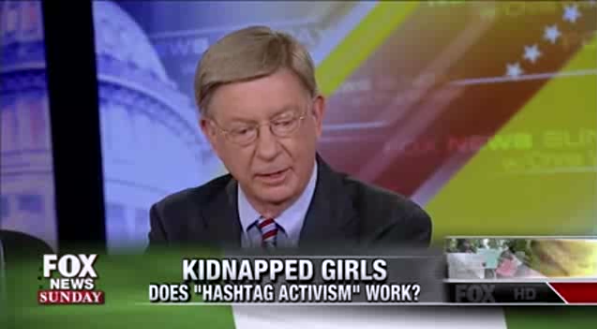Conservative columnist George will on Sunday mocked the #BringBackOurGirls social media campaign, for which Michelle Obama and others have posted photos with the hashtag to call attention to the 300 Nigerian girls kidnapped by Boko Haram a month ago.
“It’s an exercise in self-esteem. I do not know how adults stand there, facing a camera and say, ‘Bring back our girls.'” Will said on “Fox News Sunday.” “Are these barbarians in the wilds of Nigeria supposed to check their Twitter accounts and say, ‘Oh, Michelle Obama’s very cross with us, we better change our behavior?'”
“Power is the ability to achieve intended effects. This is not intended to have any effect on the real world,” he continued.
Watch the clip via the Daily Caller:







I think that every time I hear you speak, George.
GW— pissant among pissants.
Who are mortally afraid of strong, educated, articulate women…
“Barbarians in the wild” sort of sums up how he sees the girls, too. It’s like he can’t even hide his disdain for them. If there were two hundred missing white girls being held by terrorists, how would Fox react?
George Will would certainly know about masturbatory exercises in self-esteem.
I don’t see how the knee-jerk conservative bashing of this hashtag plays out in their favor. Sure, they’re using this mockery to play to the angry base–but don’t Will and the conservative bloggers realize how MoveOn, DCCC, and WH will use this kind of monstrously callous statement against GOP?
I just don’t get how they strategize this.
Although George Will doesn’t frame his argument in very compassionate terms, peer-reviewed empirical/social science research suggests that he might actually be right. Social movement scholars and practitioners have a long way to go before we can effectively translate social media posts to meaningful support of causes.
See, for example, The Structure of Online Activism by Lewis, Gray, and Meierhenrich in Sociological Science (2014) and The Nature of Slacktivism: How the Social Observability of an Initial Act of Token Support Affects Subsequent Prosocial Action by Kristofferson, White, and Peloza in the Journal of Consumer Research (2014).